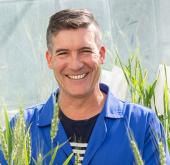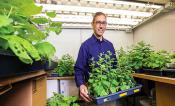Although light is fundamental for photosynthesis to take place, high light intensity can actually damage the plant, much like how high light intensity can cause us to sunburn. To avoid this, plants have several photo-protective mechanisms that protect them by siphoning off any extra light energy as heat. However, when the leaf is shaded, this protective process can inhibit photosynthesis for several minutes to several hours.
One of these photoprotection mechanisms that plants use to get deal with excess light is called non-photochemical quenching (NPQ). NPQ turns on rapidly at high light intensity; however, it is slow to turn off when light becomes limited, such as when a cloud passes overhead. As a result, photosynthetic efficiency decreases as the plant adjusts to the lower light intensity. The RIPE project is speeding up the plant’s recovery rate in shade—allowing the plant to photosynthesize more efficiently as the light intensity fluctuates throughout the day.























